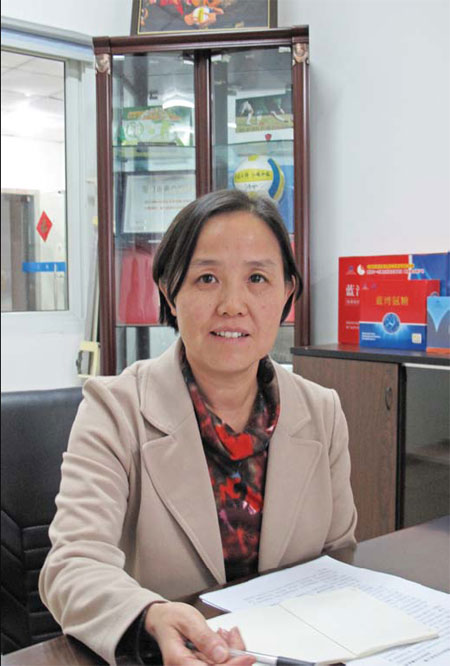Riding the crest of success
Updated: 2013-01-11 09:40
By Zhang Haizhou (China Daily)
|
|||||||||||
|
Lin Xiufen, general manager of Blue Bay Science & Technology Co Ltd. Zhang Haizhou / China Daily |
Entrepreneur braves the odds to chart a success story from the sea
'It's hard to fly in the sky, but it's even more tough to dive deep into the sea," says an exasperated Lin Xiufen after spending eight years unlocking the mysteries of the oceans.
Despite the odds stacked against her, the general manager of Xiamen Blue Bay Science & Technology Co Ltd, a marine biomedicine firm in Fujian province, remains confident on the prospects for the blue economy in China and the potential rewards for those who are willing to brave the currents.
Lin's company Blue Bay is one of the few in China that makes glucosamine capsules, a non-prescription dietary supplement used for treating osteoarthritis symptoms and to help maintain healthy joint cartilage. The capsules are made from high purity sodium (potassium) free glucosamine sulfate harvested from the shells of shellfish like prawn and crab.
Lin says that her company can produce up to 20 tons of pure glucosamine sulfate every year with purity levels in excess of 90 percent compared with the global norms of 80 percent.
"It is a high-yield product as a ton of glucosamine can command prices of up to 10 million yuan ($1.6 million; 1.2 million euros)," Lin says.
Though the returns are high, Lin, in her 40s, says that the initial years were harrowing.
To begin with, high-purity glucosamine was a new research product developed by the Third Institute of Oceanography, under the State Oceanic Administration in Xiamen. Like many other new high-tech products, TIO's glucosamine did not have backers initially and there was an acute funding crunch for commercializing the product.
Eyeing the promising future for the product, Lin set up Blue Bay in 2005 after leaving a high-paid director-level job at a state-owned financial firm. She says that to generate the seed capital for the venture, she had to sell most of the property she owned. "To date, I have invested nearly 60 million yuan in the project."
Even then, it took nearly four years for the company to start making Glucosamine. "We rented laboratories and equipment for making the first batch of products, a few tons of glucosamine capsules, in 2009. Since then we have managed to make some profits," Lin says.
The lack of funds was such a pressing problem in the initial years that there was even an occasion when the company had just 10,000 yuan in its coffers, making it tough even to pay the salaries of employees.
"I had to pretend to be calm and I told my accountant to never reveal the exact situation to the employees," she says. "Some parents (of the employees) were skeptical on the success of the project and openly expressed their misgivings. But I never thought of giving up," she says.
The turning point came when a healthcare employee in Xiamen told Lin over lunch to get in touch with officials from the General Administration of Sport of China and seek their help to promote and sell the products.
"I decided to take his advice and left for Beijing a few hours later. I did not know anyone at the GASC then," Lin says.
Through the help of her former schoolmates, Lin managed to find a retired table tennis player, a former colleague of Zhuang Zedong, the three-time world men's singles champion and champion at numerous other table tennis events, and persuaded him to take the glucosamine capsules to combat osteoarthritis.
That move paid off and soon Lin became a well-known name on the sports circuit in China and had an ensemble list of athletes and several former footballers that were using her products. Blue Bay's glucosamine capsules got even bigger recognition when they became an official healthcare product of the Chinese women's volleyball team.
Lin says she is now looking to take her company to even greater heights and increase production step by step as demand increases in China. Blue Bay has about 80 employees, who work in a 5,000-square-meter factory.
Apart from glucosamine capsules, the company has also developed new products like chitosan capsules. Chitosan is derived from chitin, a polysaccharide found in the exoskeleton of shellfish such as shrimp, lobster and crabs. The company's products are now sold in more than 30 provinces and 200 cities across China.
Luckily for Lin, the growth phase of her company coincided with the blue economy taking off in China. Blue Bay is already a star company on Xiamen's economic map.
With an eye on the future, the company plans to set up a new facility with an annual production capacity of 200 tons by 2014.
"It will definitely be an explosive point in the future (of China's blue economy)," she says.
zhanghaizhou@chinadaily.com.cn
(China Daily 01/11/2013 page5)
Today's Top News
Police continue manhunt for 2nd bombing suspect
H7N9 flu transmission studied
8% growth predicted for Q2
Nuke reactor gets foreign contract
First couple on Time's list of most influential
'Green' awareness levels drop in Beijing
Palace Museum spruces up
Trading channels 'need to broaden'
Hot Topics
Lunar probe , China growth forecasts, Emission rules get tougher, China seen through 'colored lens', International board,
Editor's Picks

|

|

|

|

|

|






